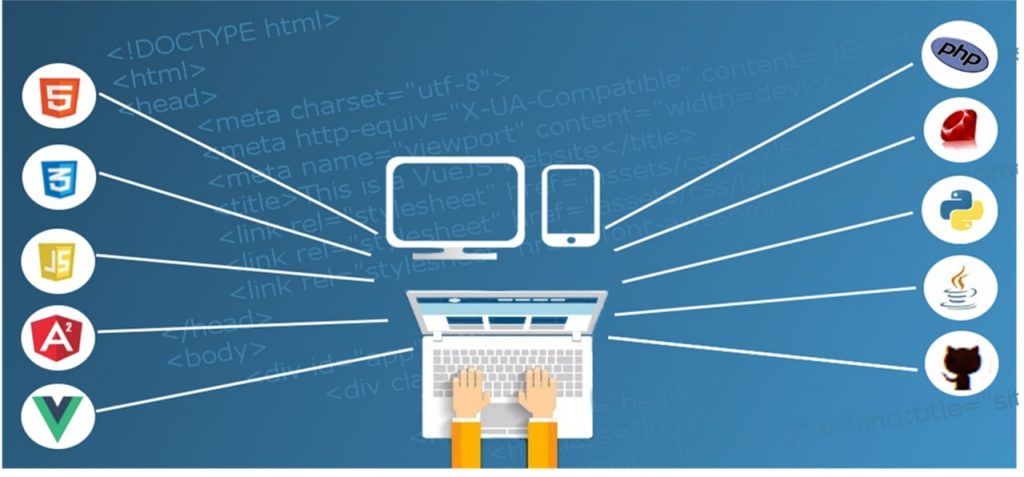Nowadays, having a website for your business is almost necessary. People spend most of their time online, browsing the internet and looking for businesses that offer the services or products they need, so having a website is of utmost importance.
They enable people to find you and they’re also your own corner of the internet, over which you have full control.
With the rise of eCommerce rose the need for websites, and consequently digital agencies, too. We’re halfway through 2020, so now would be the time to hire a digital agency to make you a website so you can enter 2021 with a fresh new look.

Here are 12 terms you need to know before hiring a digital agency, so you can speed up the website building process by getting familiar with the important terms beforehand.
Domain and hosting
The domain is a term that is often misinterpreted. There are multiple types of domains, but what is of interest to us are internet domains. An internet domain consists of the name of a website and its IP address, which is a set of numbers that looks like this: 192.168.1.1.
Buying a domain is the first step in the process of creating a website and it needs to contain the name of the business, so people can recognize it.

Next up, hosting. Simply put, hosting is a place where your website is located. Just like stores need a physical space so they can operate, websites need servers, which are provided by hosting providers. Once you have a domain and pay for a hosting service, you have both the name and place for your website.
CMS (Content Management System)
Here’s another more technical term.
A content management system is a program or software application and is used for the creation and management of digital content. Digital content includes all content on the internet, such as images and text. Think of any article you’ve ever read on the internet: all of it was done using content management systems.
They have simple user interfaces and allow users to easily write and edit content and then publish them on the internet. Content management systems consist of two components: the editing is done via a content management application and the publishing is done using a content delivery application.
WordPress – the most popular CMS
The most popular content management system (and the best one, if you ask most people who use CMSes) is WordPress. It is not only easy to use, but is also very inexpensive if you want both a WordPress domain and hosting.
Additionally, it also offers hundreds of plugins and website themes you can choose from. If you hire a digital agency to make you a website, they often offer classes on how to use WordPress, so you can continue to manage your website on your own after you part ways with them.
People who help make your website
Even a small digital agency consists of a number of people, each specialized for doing different tasks in the process of making a website.
Web developers
Web developers are responsible for creating websites. They’re behind all the coding and have the aim of creating websites with good performances. Aside from this, they also have meetings with clients, where they discuss what the client needs, no matter if they want a website built from scratch or need some improvements made on their current website.
They’re trained to know how to effectively communicate with the client, so they can get as much information as possible out of them. If the client doesn’t know exactly what they want, web developers are there to give suggestions and help them in their decisions.

So, web developers are not only people good at programming languages, but also have good communication skills.
Web designers
After web developers create the code, which is the base of the website, it is web designers’ turn to take over.
Their tasks involve the appearance of the website: how and where all the site elements are placed, what colors are the best choices, which fonts should be used, which images, as so on. They’re highly creative people with an eye for aesthetics.
Web design and web development are intertwined disciplines, and in digital agencies, designers and developers work together to create the fastest and most stunning websites.
Copywriters
In the context of website creation, if you hire a digital agency, copywriters are the people who will write the content for your website. Or, if you already have one, they will make all the necessary improvements and add additional content.
If needed, they can also write articles for your website, if you have a blog. Copywriters are trained to convey information as clearly as possible and write the most effective texts, both informative and for advertising purposes.

Wireframes
Here are two another very important terms to know, as the clients take part in this process of website design.
Wireframing is the process of creating the initial draft of a website. They’re pretty rough drafts as they contain only the elements and their positions. Before making a wireframe, the web developer consults with the client, where the client tells them their vision of a website.
After creating the wireframe, the developer speaks with the client again and presents them with the design. If the client is satisfied, then the developer starts working on the mockup.
Mockups
A mockup is a more fleshed out wireframe. The web developer adds color and details to the website elements, as well as the text and images. Mockups show what the website will look like when finished, and are an important part of the website development process because they decide the look of the finished product.

Responsiveness
This term gets thrown around a lot, and for a very good reason.
A responsive website is a website that works on all devices, both big and small. This includes smartphones, laptops, and desktops. But why is it important?
You see, desktop searches are rapidly declining and are being bested by mobile searches. The fact that in 2015, mobile browsing overtook desktop browsing speaks for itself. People carry their smartphones everywhere, and therefore use them all the time, which is why you want your website to be responsive.
If it isn’t, people on devices that aren’t desktops will have trouble opening your website, if they even can open it at all. With responsive web design, your website will not only be openable on all devices but will also perform well on all of them.
User experience
This term isn’t exclusive to website creation. When you’re in a supermarket, everything is sorted into cohesive categories and rows, in order to create a good user experience so you can easily find your way around and not get lost.
Similarly, in the context of website development, user experience, or UX, is the process that aims to make a website as friendly and as easy to use as possible.
If you have a vision of your website, a web developer might tell you that it isn’t user-friendly, which means that it will have to get changed or simplified. This is why it’s good to know what this term means.

CTA
The term CTA stands for ‘call to action’ and is a marketing term. Its purpose is to get a response out of a person and is usually placed at the end of a sales pitch. For example, if you see an ad for a product, the call to action button will be something like ‘buy now’ or ‘purchase today’ or ‘click here to shop’.
If your current website doesn’t have a call to action buttons, there’s no doubt that adding them would increase your sales.
The digital agency you hire will know where to place them and what color will be the most fitting, so they don’t annoy your visitors and actually increase your sales.
Page speed
This term is crucial for a good search engine page ranking.
After the digital agency finishes working on your website and you confirm that you like the final product, they start testing the website.
They check its speed and performance to make sure that it’s fast. But why is page speed so important?
It’s pretty simple: Google doesn’t like slow sites because their users don’t like slow sites. Imagine if the results on the first page of Google were all slow websites. The user experiencing this would maybe even stop using Google altogether, and switch to another search engine.

Google aims to provide its users with the best user experience possible, where there’s no room for slow websites.
Conclusion
Website development is a lengthy process, so speeding it up in any way is of great help. Now that you know the basic and most important terms, you will save both yours and the project manager’s time.
If you want to know more about us and what we offer, visit our services page.
Thank you for reading!





